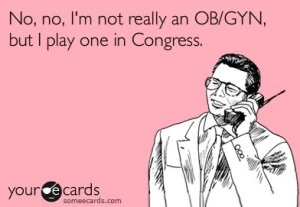Our campus magazine, North by Northwestern, recently did a cool feature called “Dormroom Debate” in which it pitted a conservative and a liberal against each other to discuss the recent Arizona abortion laws.
I think that it’s great to expose yourself to dissenting viewpoints, not just for the sake of understanding and kumbaya (though that too) but so that you can learn how to better counter them.
However, just from glancing over the article, you’ll see a problem–both of the writers are men.
Now, as a disclaimer, I don’t see anything wrong with men discussing issues like abortion and contraception. I don’t think that having a penis and/or lacking a vagina makes you unqualified to even talk about these things. I do think, however, that it’s more difficult to have a well-informed opinion on these things if you’re a man. Why? Because it means you have to take extra efforts to learn about things that women already know by default, such as how hormonal birth control actually works.
What I do think is downright wrong is the fact that women are continually being left out of conversations about their own bodies. It happens in congressional hearings, and it’s happening–albeit to a much less drastic and harmful degree–in our own campus magazine.
I’ll grant that this particular “panel” only involved two student writers, so it’s almost certain that women were left out of it entirely by accident. However, considering that Northwestern has slightly more women than men, and the school of journalism is even more skewed towards women, I find it very unlikely that the editors of NBN could not have produced at least one woman to participate in this debate.
What bothers me much more than the fact that NBN chose two men to discuss what women should and should not be able to do with their bodies, however, was the content of the conservative writer’s piece. Now, obviously, I knew from the get-go that I was going to disagree. However, I expected an entirely different line of argument.
For instance, as a conservative, you can make the argument that abortion laws should be left up to the states. You can make the argument that these laws make restrictions on abortion without actually taking away the right to get one. You can make the argument that these restrictions are necessary because they actually make abortion safer. You can even make the argument that abortion is morally wrong because you believe that life begins at conception.
You can make all those arguments, and I’d disagree with all of them, but they would at least be legitimate, logical arguments. Up until the end, the arguments that the conservative writer was making were mostly these. But then:
Opponents of this law do not really prioritize women’s health and their right to choose. Instead of wanting women to make smart decisions for themselves, they become “pro-abortion.” Their ultimate goal is the slaughter of innocent babies, so women can maintain their more comfortable lifestyles rather than live with the results of their choices — both the trials and the blessings.
Reread this: “Their ultimate goal is the slaughter of innocent babies.”
I’m going to go line by line now:
“Opponents of this law do not really prioritize women’s health and their right to choose.”
There is absolutely no evidence for this claim. None whatsoever.
“Instead of wanting women to make smart decisions for themselves, they become ‘pro-abortion.'”
Classic strawman fallacy. If indeed there are any pro-choice advocates who think that abortion is a “good” thing, or even that it is a decision to be made lightly, they can only be a tiny minority. In fact, the liberal writer in this piece explicitly states, “I believe every abortion is a tragedy.” Why not take him at his word?
“Their ultimate goal is the slaughter of innocent babies…”
Do I even need to say anything about this?
Just in case, I will anyway. Because there is no scientific or legal consensus regarding when life begins, individuals are free to define it for themselves as they choose. Those who believe life begins at conception probably would not choose to get an abortion. But those who believe that life begins at birth (or at the third trimester) do not believe that abortion is murder. Therefore, accusing them of promoting “the slaughter of innocent babies” is unfair. In other words, because there is considerable ambiguity in the definition of life’s beginning, it’s quite intellectually disingenuous to accuse those who disagree with your personal definition of advocating murder. Also, hello appeal to emotion.
“…so women can maintain their more comfortable lifestyles rather than live with the results of their choices — both the trials and the blessings.”
This statement shows a stunning lack of understanding of why women might choose to get abortions. First of all, statistically, most women who find themselves in that situation never had “comfortable lifestyles” to begin with. They tend to be young, single, and working-class. A woman who winds up accidentally pregnant is likely to be someone who didn’t have sufficient access to contraception–or, more tragically, a victim of sexual assault.
Second, the wording of this sentence clearly shows that the writer considers pregnancy, childbirth, and child rearing to be an acceptable consequence for a woman’s “choice”–meaning, obviously, the choice to have sex. Since I’m guessing this writer is someone who believes that sex should be for procreation only, there’s little I can really say in response except that, guess what, that’s not how the vast majority of people see it anymore.
I’m neglecting something here, of course. This writer made it clear from the very beginning of his piece that he’s not basing his arguments on logic or on conservative political ideology at all. At the very beginning, he writes:
My dad is a confessional Lutheran pastor, my mom a parochial school teacher, and I went to a Lutheran High School. Because of this upbringing, I have a strong belief in my innate sinfulness and need for my Savior, Jesus Christ. My faith is the primary foundation for my political ideology and is why I would say I’m a pretty staunch conservative all around. I believe that we should be good stewards of the blessings God has given us and we should live in a way that is pleasing to Him.
That’s right. He comes right out and says that the basis for his political beliefs is his religion–a religion that is legitimate and meaningful to him, but a religion that not all of us share.
Political arguments must not be based on religion. We have separation of church and state for a reason.






